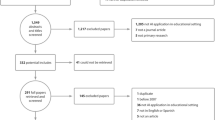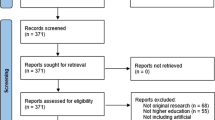Abstract
The most effective educational interventions often face significant barriers to widespread implementation because they are highly specific, resource intense, and/or comprehensive. We argue for an alternative approach to improving education: leveraging technology and cognitive science to develop interventions that generalize, scale, and can be easily implemented within any curriculum. In a classroom experiment, we investigated whether three simple, but powerful principles from cognitive science could be combined to improve learning. Although implementation of these principles only required a few small changes to standard practice in a college engineering course, it significantly increased student performance on exams. Our findings highlight the potential for developing inexpensive, yet effective educational interventions that can be implemented worldwide.

Similar content being viewed by others
References
Anderson, J. R., Boyle, C. F., & Reiser, B. J. (1985). Intelligent tutoring systems. Science, 228, 456–462.
Anderson, M. C., & McCulloch, K. C. (1999). Integration as a general boundary condition on retrieval-induced forgetting. Journal of Experimental Psychology: Learning, Memory, and Cognition, 25, 608–629.
Anderson, M. C., Bjork, R. A., & Bjork, E. L. (1994). Remembering can cause forgetting: retrieval dynamics in long-term memory. Journal of Experimental Psychology: Learning, Memory, and Cognition, 20, 1063–1087.
Armbruster, B. B., Anderson, T. H., & Ostertag, J. (1987). Does text structure/summarization instruction facilitate learning from expository text? Reading Research Quarterly, 22, 331–346.
Bransford, J. D., Brown, A. L., & Cocking, R. R. (1999). How people learn: brain, mind, experience and school. Washington, D.C.: National Academy.
Butler, K. M., Williams, C. C., Zacks, R. T., & Maki, R. H. (2001). A limit on retrieval-induced forgetting. Journal of Experimental Psychology: Learning, Memory, and Cognition, 27, 1314–1319.
Carpenter, S. K., Pashler, H., & Cepeda, N. J. (2009). Using tests to enhance 8th grade students’ retention of U.S. history facts. Applied Cognitive Psychology, 23, 760–771.
Cepeda, N. J., Pashler, H., Vul, E., Wixted, J. T., & Rohrer, D. (2006). Distributed practice in verbal recall tasks: a review and quantitative synthesis. Psychological Bulletin, 132, 354–380.
Clark, R. E. (1983). Reconsidering research on learning from media. Review of Educational Research, 53, 445–459.
Deslauriers, L., Schelew, E., & Wieman, C. (2011). Improved learning in a large-enrollment physics class. Science, 332, 862–864.
Dunlosky, J., Rawson, K. A., Marsh, E. J., Nathan, M. J., & Willingham, D. T. (2013). Improving students’ learning with effective learning techniques promising directions from cognitive and educational psychology. Psychological Science in the Public Interest, 14, 4–58.
Hattie, J. (2009). Visible learning: a synthesis of over 800 meta-analyses relating to achievement. London: Routledge.
Hattie, J., & Timperley, H. (2007). The power of feedback. Review of Educational Research, 77, 81–112.
Karpicke, J. D., & Roediger, H. L., III. (2008). The critical importance of retrieval for learning. Science, 319, 966–968.
Kirschner, P. A., Sweller, J., & Clark, R. E. (2006). Why minimal guidance during instruction does not work: an analysis of the failure of constructivist, discovery, problem-based, experiential, and inquiry-based teaching. Educational Psychologist, 41, 75–86.
Kulik, J. A., & Kulik, C. C. (1988). Timing of feedback and verbal learning. Review of Educational Research, 58, 79–97.
MacLeod, M. D., & Macrae, C. N. (2001). Gone but not forgotten: the transient nature of retrieval-induced forgetting. Psychological Science, 12, 148–152.
McDaniel, M. A., Agarwal, P. K., Huelser, B. J., McDermott, K. B., & Roediger, H. L. (2011). Test-enhanced learning in a middle school science classroom: the effects of quiz frequency and placement. Journal of Educational Psychology, 103, 399–414.
Michaelsen, L. K., Knight, A. B., & Fink, L. D. (Eds.). (2002). Team-based learning: a transformative use of small groups. Westport: Praeger.
Mullis, I. V. S., Martin, M. O., Foy, P., & Arora, A. (2012). TIMSS 2011 international results in science and mathematics. Chestnut Hill: TIMSS & PIRLS International Study Center, Boston College.
Murray, T. (1999). Authoring intelligent tutoring systems: an analysis of the state of the art. International Journal of Artificial Intelligence in Education, 10, 98–129.
OECD. (2010). PISA 2009 results: what students know and can do—student performance in reading, mathematics and science (volume I). Paris: OECD.
OECD. (2012). Education at a glance 2012: OECD indicators. Paris: OECD.
Pashler, H., Bain, P., Bottge, B., Graesser, A., Koedinger, K., McDaniel, M., et al. (2007). Organizing instruction and study to improve student learning: a practice guide (NCER 2007–2004). Washington, D.C.: National Center for Education Research, Institute of Education Sciences, U.S. Department of Education.
Roediger, H. L., & Butler, A. C. (2011). The critical role of retrieval practice in long-term retention. Trends in Cognitive Sciences, 15, 20–27.
U.S. Department of Education. (2010). Transforming American education: learning powered by technology. Washington DC: Office of Educational Technology, National Education Technology Plan 2010.
U.S. National Science Board. (2012). Science and engineering indicators 2012. Arlington: National Science Foundation (NSB 12–01).
UNESCO Institute for Statistics (UIS). (2011). Global education digest 2011. Montreal: UIS.
VanLehn, K. (2011). The relative effectiveness of human tutoring, intelligent tutoring systems, and other tutoring systems. Educational Psychologist, 46, 197–221.
Acknowledgments
The authors would like to thank Daniel Williamson, Matthew Moravec, Eva Dyer, Kevin Burleigh, and Kim Davenport for their contributions to this research. This research was supported by NSF grant no. IIS-1123617 to EJM and NSF grant no. IIS-1124535 and Google Faculty Research Award to RGB.
All authors contributed to the idea for the research. ACB and EJM designed the experiment. JPS directed the creation and implementation of the software infrastructure for OpenStax Tutor. RGB assisted in the design of OpenStax Tutor and taught the course. ACB analyzed the data and drafted the manuscript. All authors edited the manuscript. Correspondence and requests for materials and data should be addressed to ACB (andrew.butler@duke.edu).
Author information
Authors and Affiliations
Corresponding author
Rights and permissions
About this article
Cite this article
Butler, A.C., Marsh, E.J., Slavinsky, J.P. et al. Integrating Cognitive Science and Technology Improves Learning in a STEM Classroom. Educ Psychol Rev 26, 331–340 (2014). https://doi.org/10.1007/s10648-014-9256-4
Published:
Issue Date:
DOI: https://doi.org/10.1007/s10648-014-9256-4




